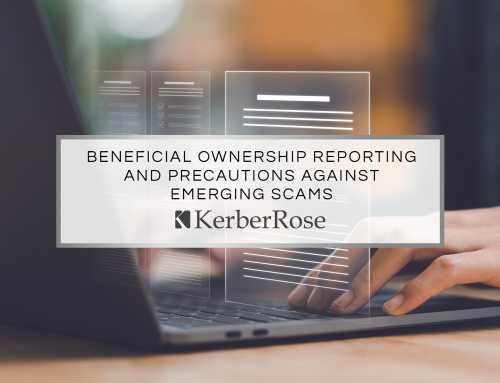Paycheck Protection Program Deadline Extended
On July 4, President Trump signed into law an amendment to the Paycheck Protection Program (PPP), allowing businesses affected by the coronavirus (COVID-19) pandemic more time to apply for federal funds. The Small Business Administration (SBA) resumed accepting applications on July 6 in response to the program’s extension legislation, and businesses will now have until August 8, 2020 to apply.
The original deadline for the PPP loan was June 30; however, with approximately $130 billion left from the initial $660 billion of allocated funds, Congress moved quickly to extend the deadline. The Senate unanimously approved the extension on Tuesday, with the House of Representatives following suit the next day.
Loan applications completed prior to June 5 will have a two-year maturity timeline, while those completed after June 5 will be subject to new guidelines of a five-year maturity timeline.
The purpose of this loan program is to alleviate the cost of business expenses, including: payroll, interest on mortgages, rent and utilities. At least 60% of the forgiven amount must be used for payroll costs. Loan forgiveness is also based on the employer maintaining or quickly rehiring employees and maintaining salary levels.
According to the SBA, more than 4.8 million loans have been approved totaling more than $500 billion, with an average loan size of about $106,000. Concerns have arisen since the SBA released these details; mainly, some of the PPP loans were given to larger businesses, many with government connections and influence, according to The Washington Post. You can find the detailed list of recipients here.
The hope is this extension will provide more opportunity to small businesses who were not aware they could or were not able to apply before.
A variety of businesses are eligible to apply for this loan, including small businesses, freelancers, self-employed workers and gig-workers. Businesses with more than 500 employees can also apply if they meet the SBA’s size standards, which can be checked using this tool.
The following entities affected by COVID-19 may be eligible:
- Any small business which meets SBA’s size standards
- Sole proprietors, independent contractors, and self-employed persons
- Any business with a NAICS Code beginning with 72 that has more than one physical location and less than 500 employees per location
- Any business, non-profit organization, veteran’s organization, or Tribal business that meets SBA industry size standard
If you have questions or would like help with the application process, contact a KerberRose Trusted Advisor or visit our contact page.
Here are some helpful links:
Paycheck Protection Program Deadline Extended
On July 4, President Trump signed into law an amendment to the Paycheck Protection Program (PPP), allowing businesses affected by the coronavirus (COVID-19) pandemic more time to apply for federal funds. The Small Business Administration (SBA) resumed accepting applications on July 6 in response to the program’s extension legislation, and businesses will now have until August 8, 2020 to apply.
The original deadline for the PPP loan was June 30; however, with approximately $130 billion left from the initial $660 billion of allocated funds, Congress moved quickly to extend the deadline. The Senate unanimously approved the extension on Tuesday, with the House of Representatives following suit the next day.
Loan applications completed prior to June 5 will have a two-year maturity timeline, while those completed after June 5 will be subject to new guidelines of a five-year maturity timeline.
The purpose of this loan program is to alleviate the cost of business expenses, including: payroll, interest on mortgages, rent and utilities. At least 60% of the forgiven amount must be used for payroll costs. Loan forgiveness is also based on the employer maintaining or quickly rehiring employees and maintaining salary levels.
According to the SBA, more than 4.8 million loans have been approved totaling more than $500 billion, with an average loan size of about $106,000. Concerns have arisen since the SBA released these details; mainly, some of the PPP loans were given to larger businesses, many with government connections and influence, according to The Washington Post. You can find the detailed list of recipients here.
The hope is this extension will provide more opportunity to small businesses who were not aware they could or were not able to apply before.
A variety of businesses are eligible to apply for this loan, including small businesses, freelancers, self-employed workers and gig-workers. Businesses with more than 500 employees can also apply if they meet the SBA’s size standards, which can be checked using this tool.
The following entities affected by COVID-19 may be eligible:
- Any small business which meets SBA’s size standards
- Sole proprietors, independent contractors, and self-employed persons
- Any business with a NAICS Code beginning with 72 that has more than one physical location and less than 500 employees per location
- Any business, non-profit organization, veteran’s organization, or Tribal business that meets SBA industry size standard
If you have questions or would like help with the application process, contact a KerberRose Trusted Advisor or visit our contact page.
Here are some helpful links:
Paycheck Protection Program Deadline Extended
On July 4, President Trump signed into law an amendment to the Paycheck Protection Program (PPP), allowing businesses affected by the coronavirus (COVID-19) pandemic more time to apply for federal funds. The Small Business Administration (SBA) resumed accepting applications on July 6 in response to the program’s extension legislation, and businesses will now have until August 8, 2020 to apply.
The original deadline for the PPP loan was June 30; however, with approximately $130 billion left from the initial $660 billion of allocated funds, Congress moved quickly to extend the deadline. The Senate unanimously approved the extension on Tuesday, with the House of Representatives following suit the next day.
Loan applications completed prior to June 5 will have a two-year maturity timeline, while those completed after June 5 will be subject to new guidelines of a five-year maturity timeline.
The purpose of this loan program is to alleviate the cost of business expenses, including: payroll, interest on mortgages, rent and utilities. At least 60% of the forgiven amount must be used for payroll costs. Loan forgiveness is also based on the employer maintaining or quickly rehiring employees and maintaining salary levels.
According to the SBA, more than 4.8 million loans have been approved totaling more than $500 billion, with an average loan size of about $106,000. Concerns have arisen since the SBA released these details; mainly, some of the PPP loans were given to larger businesses, many with government connections and influence, according to The Washington Post. You can find the detailed list of recipients here.
The hope is this extension will provide more opportunity to small businesses who were not aware they could or were not able to apply before.
A variety of businesses are eligible to apply for this loan, including small businesses, freelancers, self-employed workers and gig-workers. Businesses with more than 500 employees can also apply if they meet the SBA’s size standards, which can be checked using this tool.
The following entities affected by COVID-19 may be eligible:
- Any small business which meets SBA’s size standards
- Sole proprietors, independent contractors, and self-employed persons
- Any business with a NAICS Code beginning with 72 that has more than one physical location and less than 500 employees per location
- Any business, non-profit organization, veteran’s organization, or Tribal business that meets SBA industry size standard
If you have questions or would like help with the application process, contact a KerberRose Trusted Advisor or visit our contact page.
Here are some helpful links:




